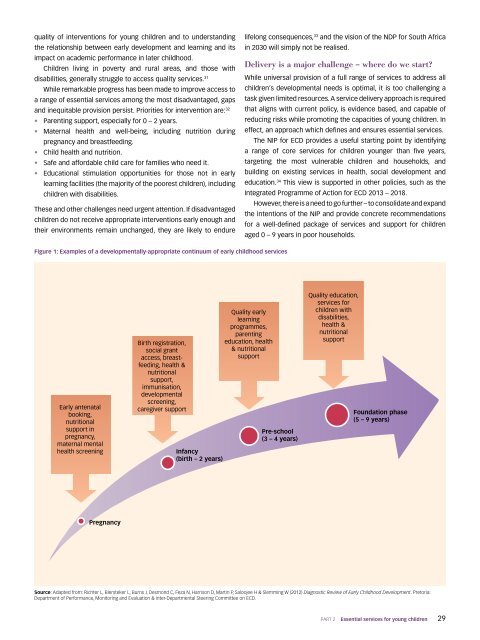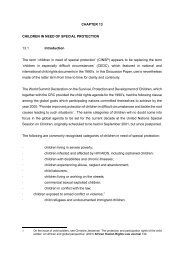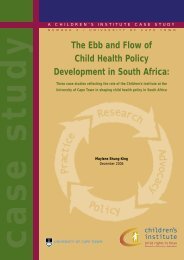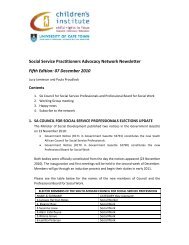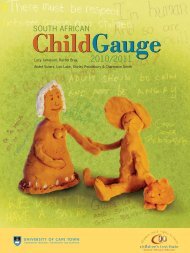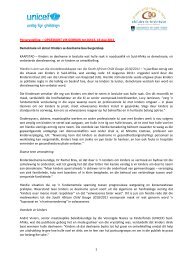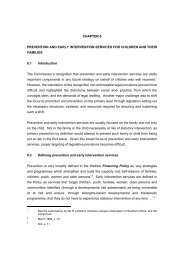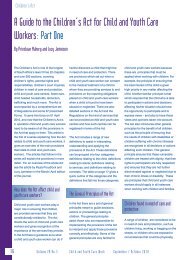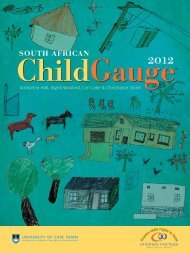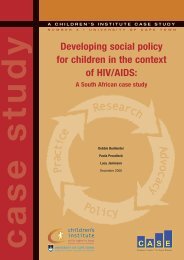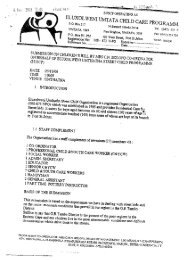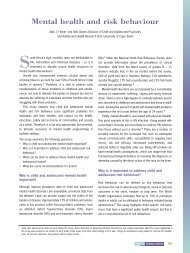quality <strong>of</strong> interventions <strong>for</strong> young children <strong>and</strong> to underst<strong>and</strong>ingthe relationship between early development <strong>and</strong> learning <strong>and</strong> itsimpact on academic per<strong>for</strong>mance in later childhood.Children living in poverty <strong>and</strong> rural areas, <strong>and</strong> those withdisabilities, generally struggle to access quality <strong>services</strong>. 31While remarkable progress has been made to improve access toa range <strong>of</strong> <strong>essential</strong> <strong>services</strong> among the most disadvantaged, gaps<strong>and</strong> inequitable provision persist. Priorities <strong>for</strong> intervention are: 32• Parenting <strong>support</strong>, especially <strong>for</strong> 0 – 2 years.• Maternal health <strong>and</strong> well-being, including nutrition duringpregnancy <strong>and</strong> breastfeeding.• Child health <strong>and</strong> nutrition.• Safe <strong>and</strong> af<strong>for</strong>dable child care <strong>for</strong> families who need it.• Educational stimulation opportunities <strong>for</strong> those not in earlylearning facilities (the majority <strong>of</strong> the poorest children), includingchildren with disabilities.These <strong>and</strong> other challenges need urgent attention. If disadvantagedchildren do not receive appropriate interventions early enough <strong>and</strong>their environments remain unchanged, they are likely to endurelifelong consequences, 33 <strong>and</strong> the vision <strong>of</strong> the NDP <strong>for</strong> South Africain 2030 will simply not be realised.Delivery is a major challenge – where do we start?While universal provision <strong>of</strong> a full range <strong>of</strong> <strong>services</strong> to address allchildren’s developmental needs is optimal, it is too challenging atask given limited resources. A service delivery approach is requiredthat aligns with current policy, is evidence based, <strong>and</strong> capable <strong>of</strong>reducing risks while promoting the capacities <strong>of</strong> young children. Ineffect, an approach which defines <strong>and</strong> ensures <strong>essential</strong> <strong>services</strong>.The NIP <strong>for</strong> <strong>ECD</strong> provides a useful starting point by identifyinga range <strong>of</strong> core <strong>services</strong> <strong>for</strong> children younger than five years,targeting the most vulnerable children <strong>and</strong> households, <strong>and</strong>building on existing <strong>services</strong> in health, social development <strong>and</strong>education. 34 This view is <strong>support</strong>ed in other policies, such as theIntegrated Programme <strong>of</strong> Action <strong>for</strong> <strong>ECD</strong> 2013 – 2018.However, there is a need to go further – to consolidate <strong>and</strong> exp<strong>and</strong>the intentions <strong>of</strong> the NIP <strong>and</strong> provide concrete recommendations<strong>for</strong> a well-defined <strong>package</strong> <strong>of</strong> <strong>services</strong> <strong>and</strong> <strong>support</strong> <strong>for</strong> childrenaged 0 – 9 years in poor households.Figure 1: Examples <strong>of</strong> a developmentally-appropriate continuum <strong>of</strong> early childhood <strong>services</strong>Early antenatalbooking,nutritional<strong>support</strong> inpregnancy,maternal mentalhealth screeningBirth registration,social grantaccess, breastfeeding,health &nutritional<strong>support</strong>,immunisation,developmentalscreening,caregiver <strong>support</strong>Infancy(birth – 2 years)Quality earlylearningprogrammes,parentingeducation, health& nutritional<strong>support</strong>Pre-school(3 – 4 years)Quality education,<strong>services</strong> <strong>for</strong>children withdisabilities,health &nutritional<strong>support</strong>Foundation phase(5 – 9 years)PregnancySource: Adapted from: Richter L, Biersteker L, Burns J, Desmond C, Feza N, Harrison D, Martin P, Saloojee H & Slemming W (2012) Diagnostic Review <strong>of</strong> Early Childhood Development. Pretoria:Department <strong>of</strong> Per<strong>for</strong>mance, Monitoring <strong>and</strong> Evaluation & Inter-Departmental Steering Committee on <strong>ECD</strong>.PART 2Essential <strong>services</strong> <strong>for</strong> young children29
<strong>An</strong> <strong>essential</strong> <strong>package</strong> <strong>of</strong> <strong>services</strong> <strong>and</strong> <strong>support</strong>This section presents a proposed “<strong>essential</strong> <strong>package</strong> <strong>of</strong> <strong>ECD</strong><strong>services</strong> <strong>and</strong> <strong>support</strong>” (the <strong>essential</strong> <strong>package</strong>), drawing heavily onthe work <strong>of</strong> Ilifa Labantwana vi . 35Different inputs are required at various stages <strong>of</strong> a child’sdevelopment. It is there<strong>for</strong>e necessary to build a continuum<strong>of</strong> <strong>services</strong> appropriate to the stages <strong>of</strong> development, fromconception throughout pregnancy through to the first years <strong>of</strong>school (see figure 1 on p. 29).The examples <strong>of</strong> <strong>services</strong> illustrated in figure 1 can be clusteredin five basic components. These make up the notion <strong>of</strong> an <strong>essential</strong><strong>package</strong>:1. Nutritional <strong>support</strong>2. Social <strong>services</strong>3. Maternal <strong>and</strong> child health <strong>services</strong>4. Support <strong>for</strong> primary caregivers5. Stimulation <strong>for</strong> early learningSuch an <strong>essential</strong> <strong>package</strong> <strong>of</strong> <strong>services</strong> must be viewed within thecontext <strong>of</strong> a broader set <strong>of</strong> provisions such as poverty alleviation,food security, basic household <strong>services</strong> <strong>and</strong> violence preventionthat create an environment conducive to young children’sdevelopment. 36The proposed <strong>essential</strong> <strong>package</strong> includes <strong>services</strong> that arealready m<strong>and</strong>ated in policy <strong>and</strong> law, only adding others wherethere are gaps that must be filled, as indicated by evidence.Each component <strong>of</strong> the proposed <strong>essential</strong> <strong>package</strong> is outlinedin figure 2.Nutritional <strong>support</strong> <strong>for</strong> mothers <strong>and</strong> childrenPoor nutrition in young children is a serious health concern in SouthAfrica. The first 1,000 days <strong>of</strong> life are most critical <strong>for</strong> nutritional<strong>support</strong> to ensure optimal growth <strong>and</strong> development. The StrategicPlan <strong>for</strong> Maternal, Newborn, Child <strong>and</strong> Women’s Health <strong>and</strong>Nutrition 2012 – 2016 37 <strong>and</strong> the new Infant <strong>and</strong> Young Child FeedingPolicy 38 are two key policies providing a framework <strong>for</strong> <strong>essential</strong>nutrition <strong>services</strong>.Social <strong>services</strong>Timely birth registration enables access to other <strong>services</strong> suchas social grants, free health care <strong>and</strong> education. Access to socialgrants is associated with improved nutrition, 39 <strong>and</strong> there<strong>for</strong>e takeupneeds to be strengthened in the first year <strong>of</strong> life.Social <strong>services</strong> are a vital <strong>support</strong> to families <strong>and</strong> children,including prevention <strong>and</strong> protection from abuse <strong>and</strong> neglect. Manychildren in South Africa experience violence, abuse, neglect <strong>and</strong>the loss <strong>of</strong> caregivers, <strong>and</strong> psycho-social <strong>support</strong> <strong>services</strong> may beneeded to help children cope with grief, loss <strong>and</strong> trauma.Maternal <strong>and</strong> child health <strong>services</strong>Early development begins at conception, <strong>and</strong> maternal <strong>and</strong> childhealth <strong>services</strong> are crucial <strong>for</strong> laying the foundation <strong>for</strong> optimalmaternal health <strong>and</strong> child development. Primary level <strong>services</strong> <strong>for</strong>pregnant women <strong>and</strong> young children serve to prevent illnesses,<strong>and</strong> promote good care <strong>and</strong> nutrition. Early intervention is <strong>essential</strong>to minimise risks <strong>and</strong> prevent develpoment delay <strong>and</strong> disability.Support <strong>for</strong> primary caregiversSupport <strong>for</strong> primary caregivers includes in<strong>for</strong>mation sharing onparenting <strong>and</strong> psycho-social <strong>support</strong>. Many caregivers living inpoverty carry significant burdens <strong>of</strong> care. Depression is common<strong>and</strong> may compromise their capacity to care <strong>for</strong> young children. 40Psycho-social <strong>support</strong> <strong>for</strong> caregivers is there<strong>for</strong>e <strong>essential</strong> topromote the well-being <strong>of</strong> caregivers <strong>and</strong> to reduce the risk <strong>of</strong> poorcaregiving. In addition, the Children’s Act 41 provides <strong>for</strong> parentingprogrammes that <strong>support</strong> parents to provide responsive care <strong>for</strong>young children.Safe <strong>and</strong> af<strong>for</strong>dable child care (including after-care <strong>for</strong> schoolagechildren) provides much needed <strong>support</strong> <strong>for</strong> caregivers whowork, study or are unable to care <strong>for</strong> their children.Stimulation <strong>for</strong> early learningAccess to quality early learning stimulation prior to grade Rsignificantly enhances the ability <strong>of</strong> children from impoverishedbackgrounds to benefit from schooling. 42 Early development <strong>and</strong>learning are inextricably tied to nurturing contexts <strong>and</strong> the home isthere<strong>for</strong>e a key site <strong>for</strong> intervention. 43Readiness to learn is not solely an outcome <strong>of</strong> engagement inearly learning opportunities. Children should also be demonstratingtheir emerging ability to exercise self-control, concentrate, <strong>and</strong> plan<strong>and</strong> reflect on their actions by the time they enter school. 44 A range<strong>of</strong> early learning opportunities are available be<strong>for</strong>e school <strong>and</strong> canbe delivered through home visiting, community playgroups, toylibraries <strong>and</strong> centre-based programmes.Stimulation <strong>for</strong> early learning prior to the foundation phase<strong>of</strong> <strong>for</strong>mal schooling is not enough. Quality education is crucialthroughout the foundation phase to improve outcomes <strong>and</strong>prepare learners <strong>for</strong> later schooling.viIlifa Labantwana is a multi-donor partnership which develops models <strong>for</strong> scaling up integrated <strong>ECD</strong> in South Africa.30South African Child Gauge 2013


